Scaling Your Startup Mastering the Four Stages from Idea to $10 Bil ion Peter S. Cohan SCALING YOUR STARTUP MASTERING THE FOUR STAGESFROM IDEA TO $10 BILLIONPeter S. CohanScaling Your Startup: Mastering the Four Stages from Idea to $10 Billion Peter S. Cohan Marlborough, MA USA ISBN-13 (pbk): 978-1-4842-4311-4 ISBN-13 (electronic): 978-1-4842-4312-1 https://doi.org/10.1007/978-1-4842-4312-1 Library of Congress Control Number: 2019930174 Copyright 2019 by Peter S. Cohan This work is subject to copyright. All rights are reserved by the Publisher, whether the whole or part of the material is concerned, specifically the rights of translation, reprinting, reuse of illustrations, recitation, broadcasting, reproduction on microfilms or in any other physical way, and transmission or information storage and retrieval, electronic adapta tion, computer software, or by similar or dissimilar methodology now known or hereafter developed.
Trademarked names, logos, and images may appear in this book. Rather than use a trademark symbol with every occurrence of a trademarked name, logo, or image we use the names, logos, and images only in an editorial fashion and to the benefit of the trademark owner, with no intention of infringement of the trademark. The use in this publication of trade names, trademarks, service marks, and similar terms, even if they are not identified as such, is not to be taken as an expression of opinion as to whether or not they are subject to proprietary rights. While the advice and information in this book are believed to be true and accurate at the date of publication, neither the authors nor the editors nor the publisher can accept any legal responsibility for any errors or omissions that may be made. The publisher makes no warranty, express or implied, with respect to the material contained herein. Managing Director, Apress Media LLC: Welmoed Spahr Acquisitions Editor: Shiva Ramachandran Development Editor: Laura Berendson Coordinating Editor: Rita Fernando Cover designed by eStudioCalamar Distributed to the book trade worldwide by Springer Science+Business Media New York, 233 Spring Street, 6th Floor, New York, NY 10013.
Phone 1-800-SPRINGER, fax (201) 348-4505, e-mail . Apress Media, LLC is a California LLC and the sole member (owner) is Springer Science + Business Media Finance Inc (SSBM Finance Inc). SSBM Finance Inc is a Delaware corporation. For information on translations, please e-m rights-permissions. Apress titles may be purchased in bulk for academic, corporate, or promotional use. eBook versions and licenses are also available for most titles.
For more information, reference our Print and eBook Bulk Sales web page at www.apress.com/bulk-sales. Any source code or other supplementary material referenced by the author in this book is available to readers on GitHub via the books product page, located at www.apress.com/ 9781484243114. For more detailed information, please visit www.apress.com/source-code. Printed on acid-free paper To Robin. Contents  About the Author Peter S Cohan is Lecturer of Strategy at Babson College. He teaches strategy and entrepreneurship to undergraduate and MBA students at Babson College. He is the founding principal of Peter S.
About the Author Peter S Cohan is Lecturer of Strategy at Babson College. He teaches strategy and entrepreneurship to undergraduate and MBA students at Babson College. He is the founding principal of Peter S.
Cohan & Associates, a management consulting and venture capital firm. He has completed over 150 growth strategy consulting projects for global technology companies and invested in seven startupsthree of which were sold for over $2 billion. Peter has written 13 books and writes columns on entrepreneurship for Forbes, Inc, and The Worcester Telegram & Gazette. Prior to starting his firm, he worked as a case team leader for Harvard Business School professor Michael Porters consulting firm and taught at MIT, Stanford, and the University of Hong Kong. Peter earned an MBA from Wharton, did graduate work in computer science at MIT, and holds a BS in Electrical Engineering from Swarthmore College. Acknowledgments This book has benefited greatly from the help of many people.
I could not have embarked on this project without the enthusiastic support of Nan Langowitz, who chairs the Management Division at Babson. My Babson colleagues Alana Anderson, Renee Graham, Alexandra Nesbeda, and Sam Hariharhan provided helpful suggestions. Without Apress this book would not exist. I am most grateful to Shivangi Ramachandran for her enthusiastic support of the idea for this book and for the outstanding editing and project management help from Laura Berendson and Rita Fernando Kim. Finally, I could not have completed this book without the help of my wife, Robin, who patiently read and commented on many of the chapters and my children, Sarah and Adam, who always make me proud. Introduction I wrote this book because there is nothing more important to startup success than a leaders ability to scale it.
I came to this realization while writing StartupCities (Apress, 2018) where I saw that what makes the difference between the few startup hubs and the many that aspire to be is the relatively high propor tion of CEOs who can turn a business idea into a large company. More specifi cally, I noticed that cities vary in their mix of three kinds of business leaders: Amblers (who start and run businesses that employ friends and family), Sprinters (who can turn a business idea into a company that grows fast and is bought by a larger firm), and Marathoners (who turn an idea into a huge, fast-growing, publicly-traded company that supports the creation of local startups). While there are a few marathoners with no prior startup experience, such as Amazons Jeff Bezos or Facebooks Mark Zuckerberg, who reach this pinnacle, most sprinters and marathoners learn their leadership skills through a series of corporate and startup jobs that help them gain the skills they need to turn an idea into a large company. Whats more, within those categories there are finer gradations of leadership skills. More specifically, startups go through dis tinct stages in their growth from an idea into a large company, whether they are acquired or go public. The three kinds of business leaders relate differ ently to the four scaling stages.
Amblers are not interested in scaling and are happy to sustain themselves at stage 1. The sprinter wants to get to stage 3 and then do other things, and the marathoner wants to participate in stages 1 to 4. But regardless of how leaders define these stages, quite frequently, the found ers of these startups cannot lead the company through each stage. In most cases, founders swallow their pride, realizing that they can either remain CEO and not raise the capital their company needs to survive, or they can give up the top job. Sometimes those founders leave the company when a new CEO joins and sometimes they stick around as chief technology officer and report to that new CEO. Often such deposed founders learn from the experience, either by role modeling from the new CEO or by consulting mentors about xii Introduction what they could have done more effectively, so they become better leaders.
If that happens, they might become a CEO of another company where their newfound know-how can help them achieve a successful exit. Simply put, scaling skills are important and they are in big demand among entrepreneurs, investors, and cities. As a teacher of entrepreneurship, I need good material on how to scale effectively to prepare students for the real world. As well see later in this book, there is good material on parts of the scaling process, such as how a startup can win its first customers. However, there is no comprehensive framework that explains all the stages and tools available to leaders seeking to turn an idea into a large company. Creating such a framework is the goal of this book.
Next page

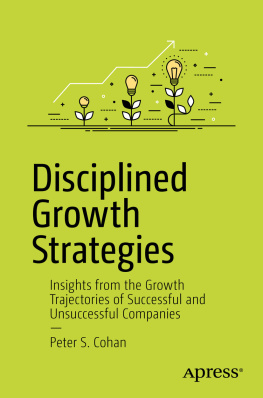

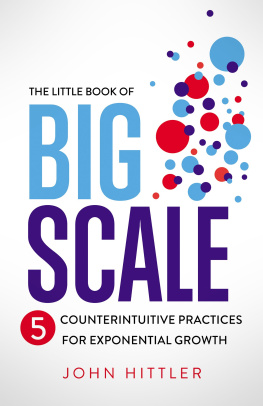
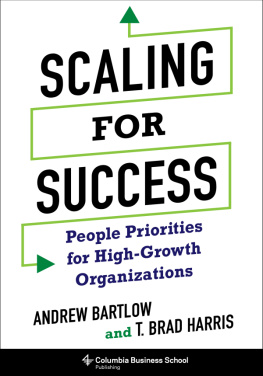
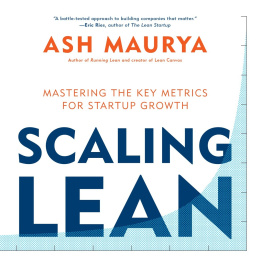
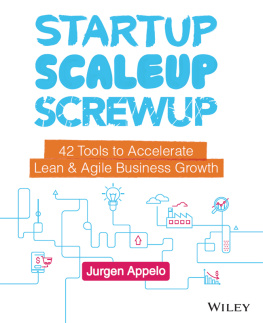
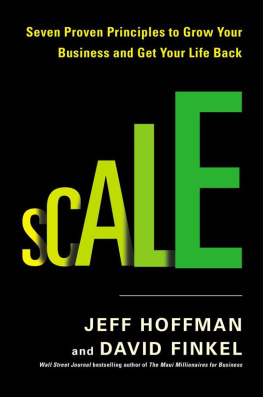
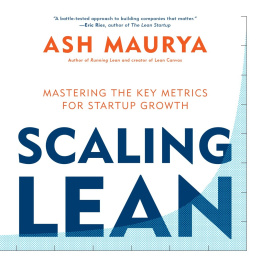
 About the Author Peter S Cohan is Lecturer of Strategy at Babson College. He teaches strategy and entrepreneurship to undergraduate and MBA students at Babson College. He is the founding principal of Peter S.
About the Author Peter S Cohan is Lecturer of Strategy at Babson College. He teaches strategy and entrepreneurship to undergraduate and MBA students at Babson College. He is the founding principal of Peter S.